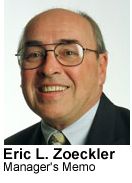 |
|
|
YOUR
COUNTY.
|
YOUR
BUSINESS JOURNAL.
|
Published May 2003
Ethical issues grow more complex in workplace
 Q.
In my role as a sales director, increasingly I am seeing people, both
in and out of my company, playing fast and very loose with established
rules of decency and ethics. I will refrain from disclosing specifics
publicly, but fear the time soon will come when I will feel compelled
to report an egregious violation of law or ethics. Does such a violation
need to be on the scale of an Enron to demand reporting?
Q.
In my role as a sales director, increasingly I am seeing people, both
in and out of my company, playing fast and very loose with established
rules of decency and ethics. I will refrain from disclosing specifics
publicly, but fear the time soon will come when I will feel compelled
to report an egregious violation of law or ethics. Does such a violation
need to be on the scale of an Enron to demand reporting?
A. In a previous generation, business ethics usually boiled down to whether you padded your expense report or purloined office equipment from the company storeroom. In today’s more complex and faster moving corporate and organizational structure, however, moral judgments are increasingly blurred whether you work from the executive suite or the custodian’s closet.
Do you hire a private investigator to infiltrate your staff if you suspect corporate secrets are being leaked to competitors? As operations manager, do you lay off staff and use the savings to purchase a more powerful computer network to boost productivity? As chief custodian, do you purchase a new, more powerful cleanser that environmental advocates say may leave behind potentially toxic residue?
Increasing difficult and far-reaching ethical dilemmas like these, where no one answer is right, are being forced by the explosion of technological change and worldwide economic competition on people not equipped to handle them, according to a renowned business ethicist, Rushworth Kidder, founder of the Institute for Global Ethics of Camden, Maine.
As organizations shrink, remaining employees are handed broader power and responsibilities. But because schools have abandoned even mere discussions of moral values over the last three decades, “people are puzzled about how to approach ethical dilemmas,’’ Kidder told me. (He’s the author of “How Good People Make Tough Choices: Resolving the Dilemmas of Ethical Living’’).
So-called whistleblowers are hailed as heroes when they’re right and the offense is calamitous, as were the cases involving Cynthia Cooper of WorldCom, Coleen Rowley of the FBI and Sherron Watkins of Enron.
They tried righting wrongs within their own organizations. A single inaccuracy in reporting individual wrongdoing can open the whistleblower to defending expensive and extensive litigation brought by the accused. For those reporting to outside agencies, federal legal protection applies only the employees of publicly traded companies.
Kidder contends, “The world won’t survive the 21st century with 20th-century ethics.” Some in business already have taken notice. Ethics was the nation’s fastest-growing training subject, a recent business survey found just before the recession of 2002. Ethics officers were becoming more visible in high-profile corporate settings. Yet protections and ethicists provide little comfort to potential whistleblowers in smaller organizations.
Kidder’s organization teaches that most moral conundrums can be resolved by examining them through the three moral principles most people know. One, utilitarianism, points to a decision that will produce the greatest good for the most people. Reason-based thinking, which calls for following a principle you’d want everyone else to follow, is the second. And third is the “Golden Rule” of judging your action by putting yourself in another’s shoes.
Applying ethical dilemmas to each thinking method may deliver varying solutions. But, by doing so, “you might begin to see the right answer emerging separate from any one way of thinking,’’ Kidder said.
When traversing the tricky rapids of business ethics, proceed cautiously and carefully.
Eric Zoeckler operates The Scribe, a business writing service with many Snohomish County-based clients. He also writes a column on workplace issues in The Herald on Mondays. He can be reached at 206-284-9566 or by e-mail to mrscribe@aol.com.
© The Daily Herald Co., Everett, WA








